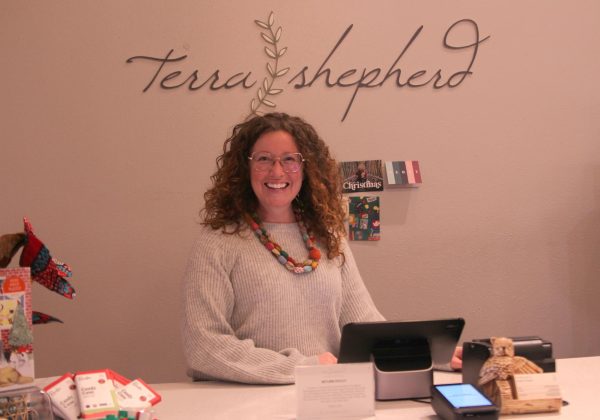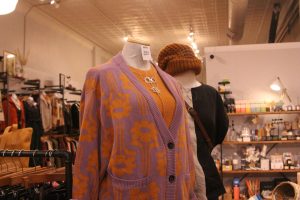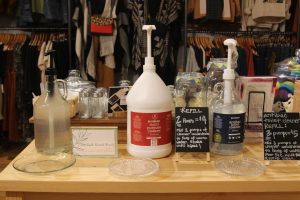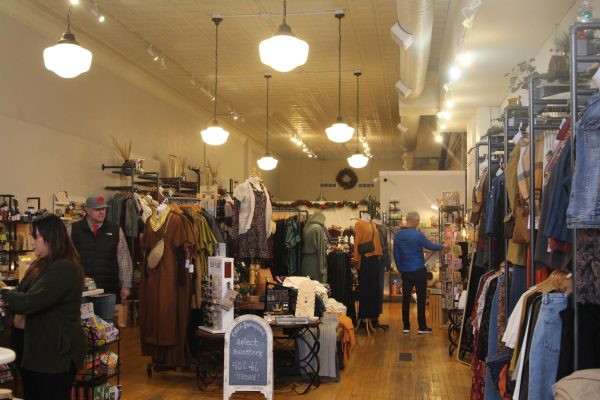It is no secret that industrial fashion production rages on, creating an estimated one truckload of textiles dumped in landfills or incinerated every second. Still, it can be difficult for consumers to escape corporate wastefulness and pursue more sustainable options.
Over the past four years, Terra Shepherd Boutique and Apothecary has provided these environmentally conscious options and offered sustainability education through their selection of eco-friendly products. Terra Shepherd is not a person but rather an encompassment of ideas for owner Sara Jamison. With “Terra” meaning “earth” in Latin and “Shepherd” meaning “guide,” the store is built upon pushing the world in a more sustainable direction. From loungewear to pantsuits, the store possesses an array of primarily women’s clothing with tags describing where pieces came from, the materials used to make them and sometimes the name of the person who handcrafted them.

A drive for this sustainable production deeply appealed to Jamison years before she opened the doors to Terra Shepherd. After years of experience in retail, she dreamt of opening a small business that fit her environmental interests and would close the gap in access to sustainably sourced clothing for Sioux Falls residents.
“I had been working in retail for many years and, much to my surprise, it became what lit my fire,” said Jamison. “But as I learned more about the fashion industry, I wanted to find a way to do it that matched my own values. Sustainability and being more familiar with where my products were coming from is so important to me, and I wanted that to be easier for people in my hometown.”
Jamison did not just stop at finding suppliers with only earth-friendly practices; she pressed further and doubled down on her research to find worker-friendly suppliers as well. This became particularly meaningful as ultra-popular fast fashion companies like SHEIN continually face accusations of worker abuse, including the enforcement of 18-hour shifts in their Chinese factories. Because of these headlines, the ethicality of clothing production became synonymous with overall sustainability for Jamison.

“I really think we talk a lot about ethical production and sustainability as though they’re two separate ideas or elements. But I truly believe you can’t have one without the other,” said Jamison. “Something that’s not ethically produced isn’t truly sustainable, and if something isn’t eco-friendly and made in a way that cares for the earth, is it really ethically produced?”
Furthermore, Jamison not only looks to promote better conditions for workers making her products but also for the people she employs herself. Jamison refers to Terra Shepherd employees as a tight-knit team, establishing more executive equality for all. This worker-first outlook, along with Terra Shepherd’s environmentalism, intrigued Tuesday Vander Weide, who has worked at the boutique for just under four years.
“I love it here. I have always been called to sustainability, along with health and wellness. Seeing someplace that offered that in Sioux Falls made me excited,” said Vander Weide. “I was really happy when the opportunity arose to have a full-time position here.
As the effects of climate change become more apparent, it can be easy for consumers to start thinking that they must live with no waste at all to be sustainable, creating waves of climate guilt. However, Jamison uses her store to display how living eco-consciously does not mean having to complete a full lifestyle change.
“We stress the possibility for small changes to have a big impact. I think that idea resonates tremendously with our community. You can come here to make those small changes,” said Jamison. “In the world of sustainability, it can be so much of an all-or-nothing mentality, and that is really intimidating. Our magic is showing people that you don’t have to make complete lifestyle changes to be more sustainable.”
Still, crafting products with sustainable materials and paying fair wages to the workers who make them inevitably drives up retail prices. Not many can afford to spend over $100 for a new outfit, no matter how long it may last, and Jamison acknowledges this. To remedy this, she set up stations around the store with pumps full of household necessities, known as a “refillery.” From eco-friendly detergent to herbal body wash, customers can refill reusable pods and containers with these liquids. This way, people can cut down on their waste production in affordable ways.

“[The refillery] felt like a natural fit. On the fashion side of things, we often talk about buying things less often, and investing in pieces when you do purchase. But I still need revenue coming in, I need people to buy things to keep the doors open. Those consumable products, whether it’s face wash, laundry powder or toilet bowl cleaner, keep people coming in,” said Jamison. “It is a great way to introduce people to ways they can reduce waste in their everyday lives.”
Even then, it has not been entirely smooth sailing for the shop. As with so many other small businesses, COVID-19 complicated Jamison’s business strategy and continues to push her through economic challenges.
“The pandemic happened before we were even a year old. The doors to Terra Shepherd were closed on our one-year anniversary,” said Jamison. “From that, there have been supply chain disruptions and fear of economic downturn. I have had to learn how to be nimble and always adjust to the ever-changing retail landscape.”
As a result of this adaptiveness, Jamison worked to expand the store’s reach much farther using both social media and an online shop for all people seeking sustainable and ethical options, no matter how far they may be.
“Social media is a connector when used for good. It has allowed us to forge relationships with customers who have become regulars that live in Massachusetts, Seattle or Michigan,” said Jamison. “It is special to be able to have that connection even when they are states away.”

In the end, Jamison knows that people are at different stages of exposure to sustainable living; she implores them all to explore their next steps, no matter how small they may seem.
“We have the variety of products that we do to meet people where they are. It might not be investing in a hand-knit sustainable sweater today, but maybe it’s buying a bamboo toothbrush,” said Jamison. “We want to be here to meet people where they are on their sustainability journey and to grow and evolve with them.”









